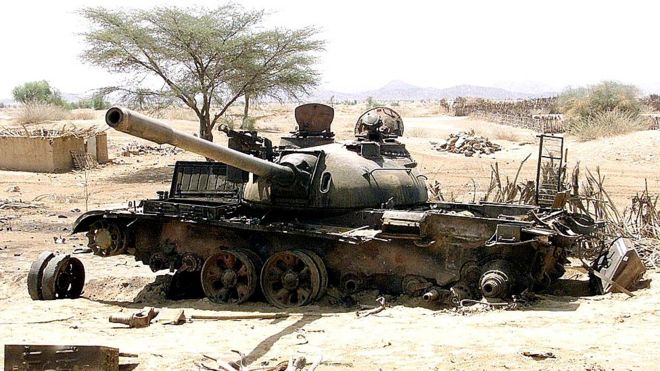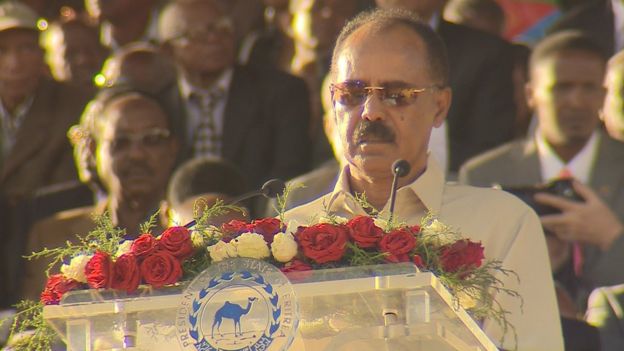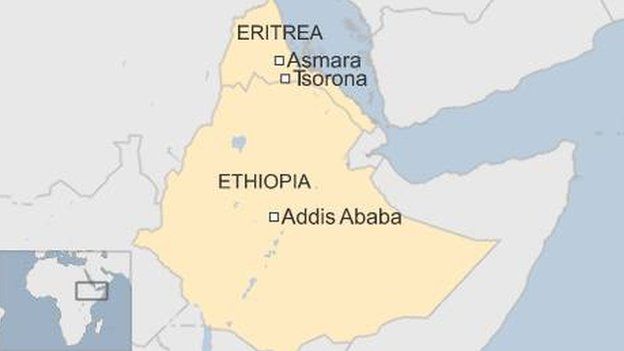- 29 minutes ago
- Africa
 AFP
AFP
Ethiopia and Eritrea have exchanged accusations over who started Sunday's fighting at their disputed border.
Ethiopia's Information Minister Getachew Reda described the clashes in the Tsorona area as "an Eritrean initiative".
Earlier, the Eritrean government said that Ethiopia had "unleashed" the attack.
A peace deal in 2000 ended the countries' two-year war border war but it has not been fully implemented.
Ever since, the countries have been in a state of "neither war nor peace", says the BBC's Ethiopia correspondent Emmanuel Igunza.
Residents on the Ethiopian side of the border reported hearing gunfire and seeing a large movement of troops and artillery towards the frontier on Sunday.
There were reports that clashes continued into Monday morning.
"There were significant casualties on both sides, but more on the Eritrean side," Mr Getachew told the AFP news agency.
Eritrea has not mentioned any casualty figures.
What sparked the clashes? Emmanuel Igunza, BBC Ethiopia correspondent:

It's not clear why the fighting has erupted now.
But in recent months both sides have upped the rhetoric with the latest verbal salvo coming from Eritrea's President Isaias Afwerki during celebrations to mark 25 years of the country's independence.
He accused Ethiopia of being hostile to Eritrea's sovereignty.
Earlier this year, Ethiopia's Prime Minister Hailemariam Desalegn said his country was ready to take "proportionate military action against Eritrea" for what he described as "continuous acts of provocation and destabilisation of Ethiopia".
Eritrea says the tense relations with Ethiopia are why it has national conscription, which can last for decades.
The 1998-2000 conflict, over the exact location of the border led to the deaths of an estimated 80,000 people.
Two versions
Mr Getachew told BBC Focus on Africa radio that the Eritrean action "was met by an overwhelming force".
"Fighting was heavy enough to result in significant damage to Eritrean forces... which will hopefully make it think twice about its dangerous moves," he added.
Speculating on why Eritrea would launch the attack, the information minister said that the country was trying to deflect attention away from a recent UN human rights report which accused Eritrea of committing crimes against humanity - charges it denies.
In a short statement issued on Sunday night, the Eritrean government said Ethiopia had "unleashed an attack against Eritrea on the Tsorona Central Front. The purpose and ramifications of this attack are not clear."
Timeline - A history of tension

- 1991 - Eritrea gains independence from Ethiopia after long civil war
- 1998-2000 - border war leaves an estimated 80,000 dead
- 2002 - boundary commission draws border and puts hotly-disputed Badme in Eritrea
- 2004 - Ethiopia accepts border ruling "in principle" but calls for dialogue with Eritrea
- 2006 - boundary commission gives the countries a year to implement ruling
- 2008 - UN ends peacekeeping mission without border demarcated
- 2012 - Ethiopia attacks positions inside Eritrea targeting "subversive groups"
- 2016 - Ethiopia and Eritrea blame each other for border clash
As part of the Algiers peace agreement signed in 2000 both countries agreed to accept the ruling of an independent boundary commission over the location of the frontier as "final and binding".
But after the commission ruled that the disputed town of Badme, where the conflict began, was in Eritrea. Ethiopia at first refused to agree to the border demarcation and then called for dialogue before it would implement the decision.
This was rejected by Eritrea and there has been an impasse ever since, although clashes have been rare.

No comments:
Post a Comment